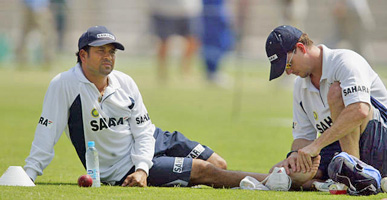ARTICLES
THE INNER GAME
- By Ashok Mankad

This is as true for the world-class sportsperson as it is for a beginner and all the levels in between. There is a deep association between peak performance, the ability to execute fluid, graceful and bio-mechanically sound movements while playing the sport and a cool, meditative mind. Admittedly, it is not easy to silence the inner voice that is constantly instructing, judging and invariably castigating oneself. However, by increasing one's awareness of what is happening within us as we play, we can greatly improve our game and in a way, transform our entire experience of playing the sport. Frustration, disappointment and anger can be replaced by an overwhelming feeling of contentment. This will enable us to grow as sportspersons as well as individuals.
While in Karachi, Pakistan with the India Veterans cricket team in March 1988, I chanced upon a book at the Holiday Inn Bookshop. Its title was "The Inner Game of Golf". Since I had just begun playing Golf, I found the title interesting and bought it. It turned out to be a fascinating treatise and is one of my most precious possessions.
The principles elucidated in the book need not be confined to Golf. In fact, they can easily be applied to cricket. Cricket and Golf have a lot in common. Both sports involve tension and at times, mental anguish. Both have the uncanny ability to expose weakness of mind and character, no matter how well the player may try to conceal both! On the cricket ground and golf course, the player is often confronted with the same obstacles that impair one's ability to learn, perform and enjoy life.
I read the book from cover to cover, and used myself as a guinea-pig of sorts. Subsequently, I applied the principles mentioned in the book to my students. The results, to put it simply, were amazing. Not only did the game of the boys improve, but their enjoyment of the sport also increased.
The author states; "If I always want an experience in life, I should first search for a constant source of experience." I found it while playing cricket and later golf. And so will you in your chosen field. But you should always be looking around, and remain fully 'conscious'!
If human beings did not have a tendency to interfere with their abilities to perform and learn, there would be no "inner game" within the individual. But the fact is that because of persistent self-interference, very few of us are able to perform to our potential on a consistent basis. Learning to 'get out of your own way' and 'leave yourself alone' can be useful from time to time. All great achievers do so. This can help you improve your "inner game skills", and enable you to overcome tension, self-doubt, fear of failure, anxiety and a limiting self-image.
In cricket, as in any other sport, it is important to be 'controlled'. The bowler has to maintain a tight and accurate line, the batsman should avoid playing rash shots, and every player has to 'control' his emotions and stay focused while the game is on.
Telling ourselves repeatedly to 'control' all these is not the most effective way to improve performance. The quality of my coaching and the learning of my students improved when I gave least instructions. I realised that over-instruction has a disrupting influence. Sometimes, I tell my students to forget everything they think they know and just go and hit the ball. Unable to forget anything they know very well, they only forget what they think they know, and their quality of their game improves by leaps and bounds! It becomes more natural and spontaneous.
The prime causes of errors in cricket are mental more than physical or technical. Indeed, there have been several players with unconventional batting or bowling techniques who attained legendary status despite their 'game' not conforming strictly to what was written in the coaching manual. An attribute that they all possessed was a sound temperament. Their success proved that cricket is played more between the ears than on the ground.
I have observed time and again that the removal of a single self-doubt has resulted in numerous technical improvements in the player's strokeplay and overall game.
Dear reader, do not put pressure on yourself, do not burden yourself with negative thoughts. Learn to enjoy yourself. The results are guaranteed. Take it from someone who knows!